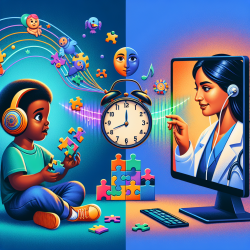Introduction
The research article "International connectedness and local disconnectedness: MNE strategy, city-regions and disruption" by Lorenzen, Mudambi, and Schotter presents a profound exploration of the strategic approaches multinational enterprises (MNEs) adopt and their implications on city-regions. This exploration is particularly relevant for practitioners in the field of speech-language pathology, especially those involved in online therapy services like TinyEYE, as it highlights the importance of balancing global strategies with local needs.
Understanding the Research
The research contrasts two primary MNE strategies: 'global orchestration' and 'local spawning.' Global orchestration focuses on leveraging international connections, often at the expense of local ties, which can exacerbate local disconnectedness. In contrast, local spawning emphasizes engaging with local ecosystems to foster and renew local connectedness, mitigating populist responses and enhancing local engagement.
Implications for Practitioners
For practitioners, especially those involved in providing online therapy services, understanding these strategies can be pivotal. Here’s how:
- Local Engagement: Emphasizing local engagement by understanding the unique needs of the communities you serve can enhance the effectiveness of therapy services. This involves tailoring services to meet local cultural and linguistic needs, which can be informed by insights from local spawning strategies.
- Balancing Global and Local: While leveraging global best practices and technologies, it is crucial to adapt these to local contexts. This balance ensures that therapy services are not only effective but also culturally relevant and accessible.
- Building Local Networks: Engaging with local educational institutions, healthcare providers, and community organizations can create a supportive ecosystem that enhances therapy outcomes. This approach mirrors the local spawning strategy, fostering local connectedness and collaboration.
Encouraging Further Research
Practitioners are encouraged to delve deeper into the research to understand the nuanced impacts of international connectedness on local disconnectedness. By doing so, they can develop strategies that not only improve service delivery but also contribute to the broader goal of reducing disparities in access to quality therapy services.
To read the original research paper, please follow this link: International connectedness and local disconnectedness: MNE strategy, city-regions and disruption.










